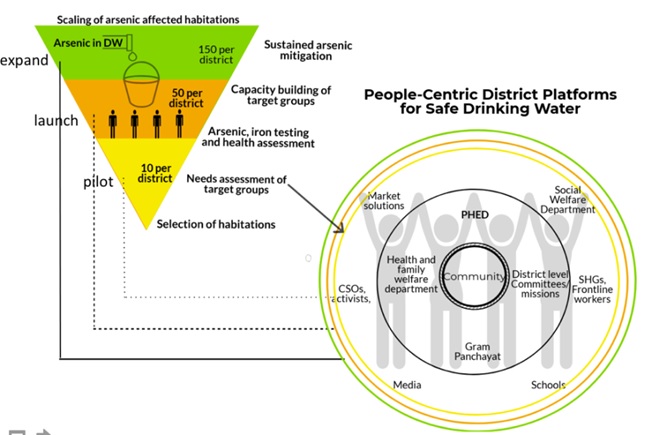Objectives
1. To build capacity of target groups (civil society, government agencies, communities) in 8 districts of 4 states for integrated mitigation of fluoride/arsenic contamination.
2. To support and devise mechanisms for the National Water Quality Sub-Mission (NWQSM) to enable ecologically sustainable and equitable service delivery to arsenic and fluoride affected regions
3. To build and empower local people-centric platform supporting 1000-1200 habitations of these 8 districts, connect with the respective district administration
4. Leverage experiences from these 8 districts for learning and replication through the NWQM with the nationwide network of CSOs addressing safe water and health issues.
The overall work packages which will meet the above objectives are as follows:
Work Package 1: Building CSO and government capacity and connecting with district administration through people-centric platform
Work Package 2: Supporting NWQSM and related programmes in water quality affected regions through people-centric district platform
Work Package 3: Leveraging district level experiences towards state and national programmes
Approach
The approach under the EU supported initiative is to build and empower people-centric platforms at the district level by expanding from 10 (pilot)/district to 50(launch)/district to 150(expand)/district affected habitations to complement the NWQSM. The district platform aims to bridge the gap between community level water quality issues/challenges concerning access to safe water and the government level stakeholders in addressing the same.

Such platforms, as shown in the above diagram, will enable convergence between different government departments such as Water supply, Health, and women welfare, along with ensuring that local citizenís involvement is maximized. It will emphasize on sustainable solutions that are ecologically sound, address the most marginalized people.Broadly, the initiative is Bihar and Assam would cater to around 600 habitations which will in turn lead to different models for improving access to safe drinking water which then can be scaled up within the respective districts and beyond too.